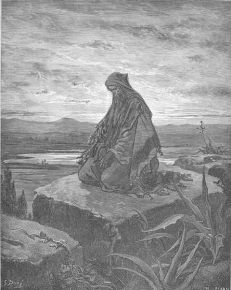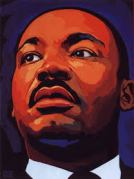A sermon, based on Isaiah 49.1-7, Psalm 40.1-5, and John 1.29-42, preached with the people of Epiphany Episcopal Church, Laurens, SC, on the 2nd Sunday after the Epiphany, January 19, 2020
+
The people Israel are conquered and taken captive by the Babylonian Empire. Defeated and dispirited, they – in the words of the psalmist, who, recalling a time of past deliverance from trouble – “waited patiently upon the Lord.” Nay, not wholly tolerant of their suffering. For who, in dire straits, is or can be? Nevertheless, they hunger for a prophetic word. Not of correction, directed at their past ills of disobedience unto the Lord. Their suffering hath accomplished that! But rather a word of consolation pointing to their future. So, Isaiah, in God’s Name, declares, “You are my servant, Israel, in whom I will be glorified.”

God recommissions the people to be “a light to the nations.” To be a witness to the world that salvation, prosperity and peace, necessarily involves – paradoxically, given human desiring, yet, given human experience, no less truly – suffering and survival.
History, biblical, modern, and post-modern, confirms that our Jewish sisters and brothers – from their exodus from Egypt, through their sojourn in the Sinai wilderness, their making their home in the land promised unto them by God, their exile in Babylon, their successive oppressions by Persian, Greek, and Roman Empires,(1) through the horror of the Holocaust, and unto this day of the persistent, pervasive, and pernicious bigotry of anti-Semitism – know the cost in suffering and the promise in survival of their witness to the world.
Some 800 years after Isaiah, John the Baptist, declared what God was doing in Jesus. “Behold, the Lamb of God who takes away the sin of the world.” John was a witness that salvation, healing and wholeness, involved sacrifice.

Jesus, through his life and ministry, was a witness to the law of life: Love God, love neighbor. Caring for the least, last, and lost. Challenging the status quo of the selfish and unshared privilege of secular and religious authorities. Thus, charting a course that inexorably ended on a sacrificial cross of crucifixion and death.
Today, we read and hear the words of Isaiah and John who were witnesses that salvation involves suffering and sacrifice.
The Greek word, martus, translated “witness,” also produces the word “martyr.” To witness, meaning more than seeing with physical sight, is to testify to a truth, always being prepared to walk toward and, if necessary, through death’s door.

Today, as we read and hear the words of Isaiah and John, we celebrate the life and commemorate the legacy of Martin Luther King, Jr. Martin believed that the American dream of universal equality to enjoy the Creator-endowed “unalienable Rights…(of) Life, Liberty and the pursuit of Happiness”(2) was unfulfilled.(3) In bearing witness, in being a witness to that truth, Martin was murdered, martyred.
Martin’s dream, our American dream remains unfulfilled. Today, in America, all cannot say, “Thank God Almighty, we are free at last.”(4) Today, in America, people, we still are judged not by the content of our character, but by our skin’s color, class status, sexuality, gender, or chosen creed. Any and all of which determine our access or lack to the fullest range of life’s opportunities. Today, in America, yes, we have made progress. Indeed, within two or three generations past, it would not have been possible for me, as an African American, to be your priest-in-charge. Yet, paraphrasing Robert Frost, there are promises to keep and miles to go before we sleep.(5)
Today, we read and hear the words of Isaiah, John, and Martin. They summon us, who follow Jesus, to be witnesses. Hearing, heeding their call, let us remember that, short of martyrdom, to be a witness, at the least, means to be an epiphany, a revelation in our words and our deeds of love and equality for all people.
So, my beloved sisters and brothers, go, be a witness!
Footnotes:
(1) Persian Empire (538-333 BCE), Greek Empire (333-63 BCE), Roman Empire (63 BCE-313 CE)
(2) From The Declaration of Independence
(3) See The American Dream, Dr. King’s commencement address delivered at Lincoln University in Pennsylvania on June 6, 1961.
(4) The closing words of King’s I Have a Dream speech, delivered on August 28, 1963 as the keynote address of the March on Washington, DC, for Civil Rights.
(5) From the poem, Stopping by Woods on a Snowy Evening
Illustrations:
The Prophet Isaiah (1866), Gustave Doré (1832-1883). Note: Doré depicts the prophet, during the period of exile in Babylon, kneeling, in the posture of a supplicant, to receive the word of the Lord he will be directed to declare to the people.
Saint John the Baptist Bearing Witness (c. 1600), Annibale Carracci (1560-1609)

Paul,
Great sermon!! Thank you for including Martin Luther King Jr. in your sermon! It seems like we are moving further away from his dream than ever and we are all “witnessing” this occurring almost daily.
One of my takeaways from this sermon is this “John was a witness that salvation, healing and wholeness, involved sacrifice.”
When I think of sacrifice in my life, I think of everything my Mom sacrificed so we could have the things she believed would help us to be good people. I’m so grateful for everything she did for us! And now her favorite saying that she literally says all day most days is “Our Lord and Savior Jesus Christ”… I still wonder why she says it, but I’f like to think that maybe she still has a sense of everything Jesus sacrificed for us.
Much love!
LikeLike
Bless you dear mother, for, amen, indeed, she lived a self-sacrificial life for your sake and, doubtless, for many others. In light of her incarnate example, as I think about witnessing – even that short of martyrdom – I ask myself: What, in my witness to God-in-Christ-in-the-power-of-the-Spirit, involves sacrifice, even suffering. Of the three s-words, sacrifice, suffering, and survival, I dare say, if I had to choose which of the three motivates me the most, it would be survival. But to what end? To what greater purpose than my own comfort and security? None that I can discern. Hence, again, I am pushed to ponder more and more the nature of sacrifice and suffering in my Christian witness.
Love
LikeLike
Paul,
Thank you for this sermon and for the reminder that biblical figures and scripture become static relics unless we allow their witness to kindle our own hearts to receive the force of their teachings in our world and in our lives. I’ve sometimes thought that in an ideal Bible there would be a book of Martin inserted after Revelation, for example. I don’t know why Dr. King’s witness isn’t every bit as unequivocal and sacred as those of prophets of earlier ages and ancient people. There would probably be other books as well, although I’m not equipped to venture what they might be and whose witness they should record.
The times we are living through are, I think, worthy to be recorded in a kind of scripture, because they are times of turning, of crisis and decision for humanity, struggling still with the same questions about our human provenance, our nature, our relationship to what is greater than we are, and our relationships with each other. The same old unanswered question: How do we live in our world and with our fellow beings?
I wish you a thoughtful, fruitful Martin Luther King, Jr. Day, Paul. Thank you for leading us into a reflective place with your sermon. May we be aware of and grateful for the witnesses of those who lead us toward peace and loving relationship with the world and with each other. May we each bear our own sacred witness to that journey.
Much love,
Karen
LikeLike
Ah, my dear Karen, I believe that we, as we read and reflect, think and feel, intend and act, are adding to the sacred text of scripture all of the time. Hence, you ARE “equipped to venture what they might be and whose witness they should record”! Moreover, and in this (your) regard, I long have believed that when we humans are in dialogue with the Bible, it is a conversation between sacred texts – that of our lives and that of the olden Hebrew and Christian communities as preserved in the Old and New Testaments. Hence, your addition of the Book of Martin resonates within me as true and right altogether.
As for your ever-sobering question, “How do we live in our world and with our fellow beings?” today was a quiet, almost languid day of little physical activity and a good deal of thinking and praying. I am striving, tho’, from moment to moment, I am not sure how successful I have been and am, to free myself from an abiding and foreboding sense of all that is not right with our world. As I cast my eye about and around me, it appears to me that our lesser angels (aye, demons) of self-regard and rapacious hunger at self-exaltation are winning the day. I feel and fear that my inner dis-ease to which I sought to give voice in my recent post, “Last Night…This Morning,” lingers. So, this night, I shall pray for the refreshment of sleep and the Spirit’s renewal.
Love
LikeLike